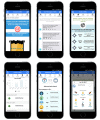A Smartphone App and Personalized Text Messaging Framework (InDEx) to Monitor and Reduce Alcohol Use in Ex-Serving Personnel: Development and Feasibility Study
- PMID: 30206054
- PMCID: PMC6231744
- DOI: 10.2196/10074
A Smartphone App and Personalized Text Messaging Framework (InDEx) to Monitor and Reduce Alcohol Use in Ex-Serving Personnel: Development and Feasibility Study
Abstract
Background: Self-reported alcohol misuse remains high in armed forces personnel even after they have left service. More than 50% of ex-serving personnel meet the criteria for hazardous alcohol use; however, many fail to acknowledge that they have a problem. Previous research indicates that interventions delivered via smartphone apps are suitable in promoting self-monitoring of alcohol use, have a broad reach, and may be more cost-effective than other types of brief interventions. There is currently no such intervention specifically designed for the armed forces.
Objective: This study sought to describe the development of a tailored smartphone app and personalized text messaging (short message service, SMS) framework and to test the usability and feasibility (measured and reported as user engagement) of this app in a hard-to-engage ex-serving population.
Methods: App development used Agile methodology (an incremental, iterative approach used in software development) and was informed by behavior change theory, participant feedback, and focus groups. Participants were recruited between May 2017 and June 2017 from an existing United Kingdom longitudinal military health and well-being cohort study, prescreened for eligibility, and directed to download either Android or iOS versions of the "Information about Drinking for Ex-serving personnel" (InDEx) app. Through the app, participants were asked to record alcohol consumption, complete a range of self-report measures, and set goals using implementation intentions (if-then plans). Alongside the app, participants received daily automated personalized text messages (SMS) corresponding to specific behavior change techniques with content informed by the health action process approach with the intended purpose of promoting the use of the drinks diary, suggesting alternative behaviors, and providing feedback on goals setting.
Results: Invitations to take part in the study were sent to ex-serving personnel, 22.6% (31/137) of whom accepted and downloaded the app. Participants opened the InDEx app a median of 15.0 (interquartile range [IQR] 8.5-19.0) times during the 4 week period (28 days), received an average of 36.1 (SD 3.2) text messages (SMS), consumed alcohol on a median of 13.0 (IQR 11.0-15.0) days, and consumed a median of 5.6 (IQR 3.3-11.8) units per drinking day in the first week, which decreased to 4.7 (IQR 2.0-6.9) units by the last week and remained active for 4.0 (IQR 3.0-4.0) weeks.
Conclusions: Personnel engaged and used the app regularly as demonstrated by the number of initializations, interactions, and time spent using InDEx. Future research is needed to evaluate the engagement with and efficacy of InDEx for the reduction of alcohol consumption and binge drinking in an armed forces population.
Keywords: alcohol misuse; armed forces; behavior change techniques; binge drinking; ex-serving; mobile phones; smartphone; text messaging.
©Daniel Leightley, Jo-Anne Puddephatt, Norman Jones, Toktam Mahmoodi, Zoe Chui, Matt Field, Colin Drummond, Roberto J Rona, Nicola T Fear, Laura Goodwin. Originally published in JMIR Mhealth and Uhealth (http://mhealth.jmir.org), 11.09.2018.
Conflict of interest statement
Conflicts of Interest: NTF is a member of the Independent Group Advising on the Release of Data for NHS (National Health Service) Digital and a trustee of The Warrior Programme. NJ is a serving member of the UK armed forces, but was not directed in any way by the Ministry of Defence. CD is partly funded by the National Institute for Health Research (NIHR) Biomedical Research Centre for Mental Health at South London and Maudsley NHS Foundation Trust and King’s College London and partly funded by the NIHR Collaborations for Leadership in Applied Health Research and Care South London at King’s College Hospital NHS Foundation Trust.
Figures



References
-
- Fear N, Iversen A, Meltzer H, Workman L, Hull L, Greenberg N, Barker Christopher, Browne Tess, Earnshaw Mark, Horn Oded, Jones Margaret, Murphy Dominic, Rona Roberto J, Hotopf Matthew, Wessely Simon. Patterns of drinking in the UK Armed Forces. Addiction. 2007 Nov;102(11):1749–59. doi: 10.1111/j.1360-0443.2007.01978.x.ADD1978 - DOI - PubMed
-
- Fear N, Jones M, Murphy D, Hull L, Iversen A, Coker B, Machell Louise, Sundin Josefin, Woodhead Charlotte, Jones Norman, Greenberg Neil, Landau Sabine, Dandeker Christopher, Rona Roberto J, Hotopf Matthew, Wessely Simon. What are the consequences of deployment to Iraq and Afghanistan on the mental health of the UK armed forces? A cohort study. The Lancet. 2010 May 22;375(9728):1783–1797. doi: 10.1016/S0140-6736(10)60672-1.S0140-6736(10)60672-1 - DOI - PubMed
-
- Babor T, Higgins-Biddle J, Saunders J, Monteiro M. Guidelines for use in primary care Internet. Geneva, Switzerland: World Health Organization; 2001. The alcohol use disorders identification test.
-
- McManus s, Bebbington P, Jenkins R, Brugha T., editors. NHS Digital. Leeds, England: NHS Digital; 2014. Mental health and wellbeing in England: Adult Psychiatric Morbidity Survey 2014.
Grants and funding
LinkOut - more resources
Full Text Sources
Other Literature Sources
Medical
Molecular Biology Databases

